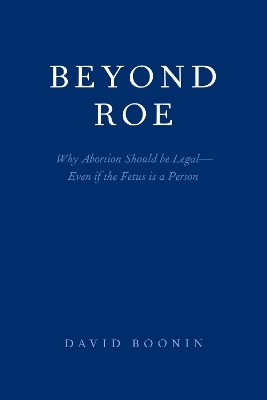
Beyond Roe
Oxford University Press Inc (Verlag)
978-0-19-090484-5 (ISBN)
By taking the analysis of the right to life that Judith Jarvis Thomson pioneered in a moral context and applying it in a legal context in this novel way, Boonin offers a fresh perspective that is grounded in assumptions that should be accepted by both sides of the abortion debate. Written in a lively, conversational style, and offering a case study of the value of reason in analyzing complex social issues, Beyond Roe will be of interest to students and scholars in a variety of fields, and to anyone interested in the debate over whether government should restrict or prohibit abortion.
David Boonin is Professor of Philosophy at the University of Colorado Boulder and Director of the Department's Center for Values and Social Policy. His books include A Defense of Abortion (2003), The Problem of Punishment (2008), Should Race Matter? (2011), and The Non-Identity Problem and the Ethics of Future People (OUP 2014).
Part I: Why Abortion Should Be Legal
Chapter 1: An Unusual Case
Chapter 2: The Lesson of the Case
Chapter 3: Changing the Case
Chapter 4: Hypothetical Cases
Chapter 5: Contraceptive Failure
Chapter 6: Failure to Use Contraception
Chapter 7: Sex Selection
Chapter 8: Genetic Screening
Chapter 9: Viability
Chapter 10: Infanticide
Chapter 11: Feticide
Part II: Objections and Responses
Chapter 12: Consent
Chapter 13: Responsibility
Chapter 14: Child Support
Chapter 15: Parents
Chapter 16: Children
Chapter 17: Natural Purposes
Chapter 18: Cause of Death
Chapter 19: Intentions
Chapter 20: Other Differences
Chapter 21: Other Objections
Part III: Why Abortion Should Be Less Restricted
Chapter 22: Insurance Restrictions
Chapter 23: The Hyde Amendment
Chapter 24: Mandatory Waiting Periods
Chapter 25: Mandatory Counseling
Chapter 26: Mandatory Ultrasounds
Chapter 27: Parental Consent and Notification
Chapter 28: Other Restrictions
Chapter 29: Summary and Conclusion
Postscript
| Erscheinungsdatum | 20.02.2019 |
|---|---|
| Verlagsort | New York |
| Sprache | englisch |
| Maße | 140 x 206 mm |
| Gewicht | 272 g |
| Themenwelt | Geisteswissenschaften ► Philosophie |
| Naturwissenschaften ► Biologie | |
| Recht / Steuern ► Allgemeines / Lexika | |
| Recht / Steuern ► EU / Internationales Recht | |
| Sozialwissenschaften ► Soziologie | |
| ISBN-10 | 0-19-090484-4 / 0190904844 |
| ISBN-13 | 978-0-19-090484-5 / 9780190904845 |
| Zustand | Neuware |
| Haben Sie eine Frage zum Produkt? |
aus dem Bereich


